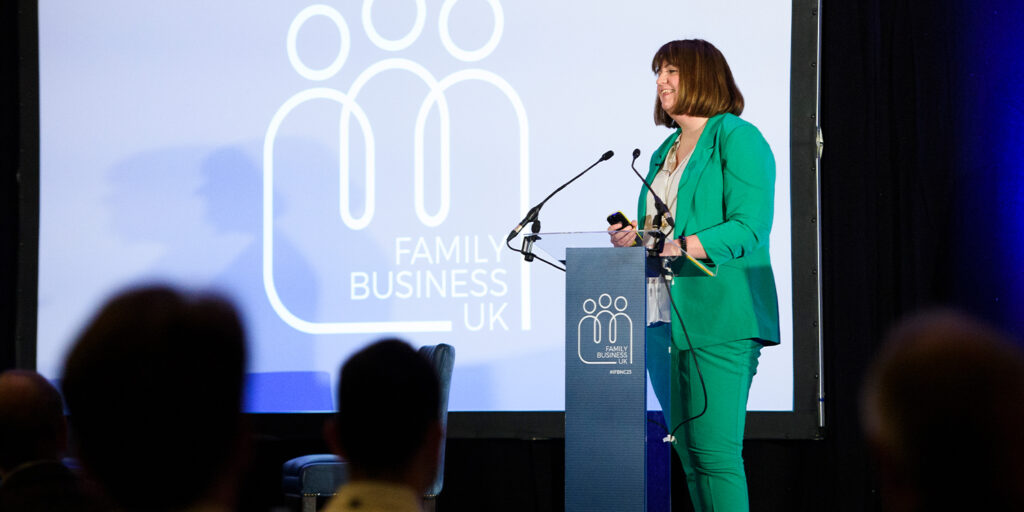Family businesses can be found across every part of the UK and in all shapes and sizes. We often associate ‘family business’ with a small shop in a quiet village, but some of the biggest UK companies are run (at least in part) by families: Dyson, JCB, the Daily Mail – to name a few.
There is no legal ‘family business’ structure in the UK, regardless of how it is registered. However, a commercial entity is usually considered family-run if the business owner or their family members have at least 25% of the right to vote according to their share capital.
Fiona Graham, Chief Advocacy Officer for Family Business UK, a not-for-profit organisation, is among the UK’s leading voices and advocates for family business. In this spotlight interview, she shares why family businesses are so important for the UK economy (despite being often overlooked), and what actions could be taken by the UK government to better support them.
Q: How would you summarise the contribution of family businesses to the UK?
A: Family businesses are the backbone of the UK economy and the bedrock of our communities. For generations, family businesses have put people at the heart of business. They offer a sustainable and responsible business model that others can learn from, be part of, work with, and even adopt.
The family business sector in the UK makes up an eye-watering 90% of all private sector firms and employs almost 14 million people. In 2020, family businesses contributed an estimated £575bn to Gross Value Added (GVA); equivalent to 51% of all private sector employment in the UK. From micro start-ups to worldwide brands, the innovation, agility and resourcefulness of the UK’s family-owned firms is second to none. By contrast, family businesses comprise around 60% of all European companies. Significantly less.
The incredible thing about the family business community is how it spans the whole of the UK, and you can find family firms across every sector. They are in our cities, our towns, villages and rural communities. By their very nature, family businesses take a long-term view, building on long-term stewardship of people and resources.
Family businesses are motivated by a desire to pass the business on to the next generation, in a stronger state than they inherited it. They feel a sense of responsibility, not only to future generations of their own family, but to their employees and the community in which they are rooted and operate. And as the owners and stewards of their businesses, they have greater freedom to experiment, innovate, and invest in their people and communities.
- Manchester is the ideal location for tech start-ups – here’s why
- Why ethnic minorities are so important to the UK economy
- 7 tips for start-ups & entrepreneurs from King’s College London
While the majority of family firms in the UK are small or micro businesses, around half of all mid-sized businesses and one in five large businesses are family-owned – highlighting how they contribute across the fabric of the UK economy. Alongside a large number of growing entrepreneurial first-generation family businesses, many family firms have been operating for hundreds of years, and their adaptability and longevity are a testament to their long-term outlook, ability to innovate, and resilience.
Q: How can Westminster better support family businesses in the UK?
A: Government policy is holding back the UK’s multinational and globally-oriented family businesses, unlike our European counterparts.
Today’s economic strategy focuses on supporting start-ups, scale-ups and the selling of companies, rather than the building or nurturing of the great family firms we already have. This is why there are only 12 UK companies in the 2023 Global Family Index (published by EY), compared with Germany’s 78, France’s 32, and Italy’s 20.
We at Family Business UK believe that, for too long, political decision-making has taken a restricted approach to investment decisions, giving too much focus to non-family business PLCs, whose priority is to meet shareholder demands for short-term returns on investments, unlike the instincts and drivers of family businesses.
Family Business UK regularly engages with the UK government, including as part of the Small Business Council meeting once a quarter. In October, we published the Family Business UK Manifesto which recommended a number of policy changes that would benefit the family business sector along the following themes: better training for staff with skills for the future, better financial support and certainty for investment in the UK economy, and better succession planning to leave businesses better off for the next generation.
More specifically, we’d like to see the Apprenticeship Levy replaced with a Future Skills Fund, and more flexibility on how businesses use the fund for skills. Moreover, it would be highly valuable to see the government develop a long-term industrial strategy (including a Business Tax Roadmap) and develop a stand-alone growth strategy for mid-sized businesses. This is to name just a few of our policy recommendations.
Q: What is the greatest threat to family businesses right now?
A: I’d like to focus on one threat that has become a fast-growing concern for family businesses in recent months: speculation around the future of Inheritance Tax and Business Property Relief.
For the family business sector, which employs 14 million people in the UK, Business Property Relief (BPR) is not a ‘loophole’, it is a lifeline. Each year, some 85,000 family SMEs transfer ownership of their business to a new generation. BPR affords these firms the ability to plan for a stable succession, while maintaining ownership stability.
BPR was specifically designed to facilitate the handing of a family business from one generation to the next, without creating a significant inheritance tax charge that the business would be unable to pay. For business-owning family members, illiquid business assets form the bulk of their estate.
Without BPR, the inheritance tax liability would be borne by the business itself. This would require the family business to be sold, liquidated or broken up to raise the necessary cash to pay the charge. This would have a clear knock-on effect on employment and investment.
Without BPR, family firms would lose the opportunity to grow under stable ownership and successfully transition to the next generation.
We agree that all reliefs must deliver for the taxpayer. BPR is a perfect example of a relief that achieves exactly what it was designed to do: enable family businesses to plan for the long term, and ensure jobs and prosperity are protected from one generation to the next.
Please note that the information provided in this article is for general informational purposes only and does not constitute legal, tax, or professional advice. While our aim is that the content is accurate and up to date, it should not be relied upon as a substitute for tailored advice from qualified professionals. We strongly recommend that you seek independent legal and tax advice specific to your circumstances before acting on any information contained in this article. We accept no responsibility or liability for any loss or damage that may result from your reliance on the information provided in this article. Use of the information contained in this article is entirely at your own risk.












Join The Discussion